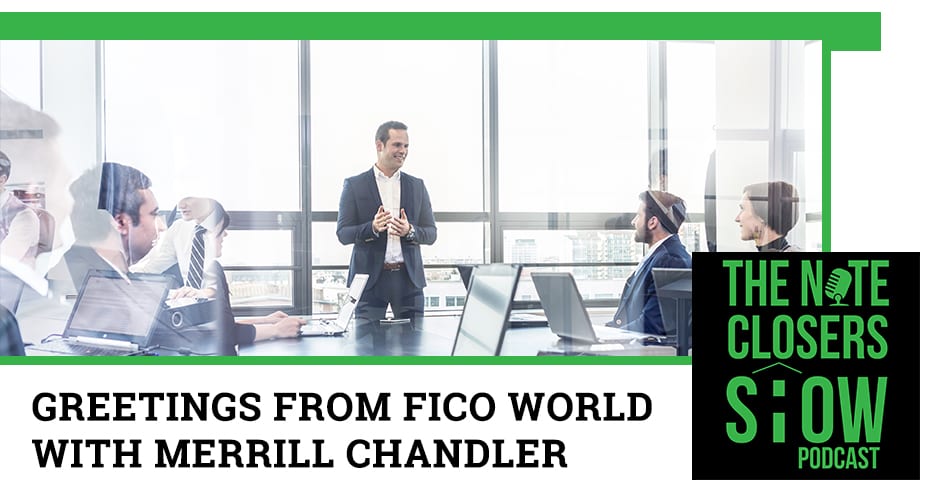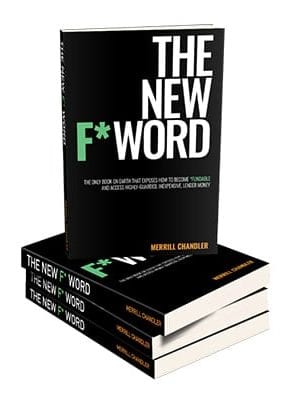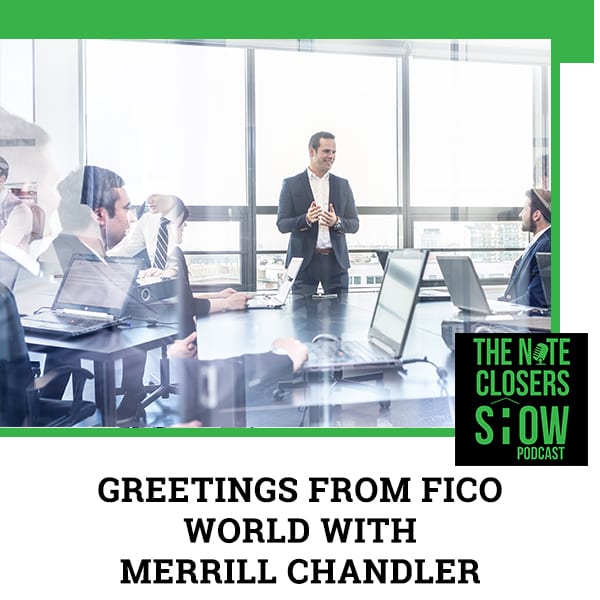
FICO World is the ultimate convention when it comes to learning the best business solutions from the best authorities. Today, Scott Carson talks with Merrill Chandler, the CEO of CreditSense, about his current trip to the FICO World Convention. Merrill shares the upcoming credit releases and things coming down the pipeline. He also talks about what the future will look like when it comes to your personal and business credit. Listen more from Scott and Merrill as they bring a lot of good things, including borrower education, to the table.
—
Watch the episode here
Listen to the podcast here
Greetings From FICO World With Merrill Chandler
We’ve got our good buddy Merrill Chandler from CreditSense to share the wonders and all the stuff he learned by peeking behind the curtain at FICO World. He was so excited, literally, it’s like he’s Candy Land and you were sharing some great stuff on Facebook. I was watching your journey as you’re interviewing people and doing episodes and you talked about all the stuff you’ve got going on with the podcast launch, the book and everything. You go to FICO World and it blows up all the great stuff in a good way. You’re adding new things and learning new stuff so I will shut up. Merrill, welcome.
As always, I’m so glad to be here. We’re going to be skipping a stone across the 7,000-foot lake. I’ve got some great things to share with you. You’re also updated on so many new FICO upfront. I’ll call FICO the Mount Olympus of the credit and funding gods. I got promoted to demigod. I’m going to be able to tell you about that because my whole opportunity to meet with so many different vice presidents. The vice presidents are asking to join a meeting. I’m already meeting with Ethan, the Vice President of scoring and analytics. He invites another vice president of Scores to come over who was the original manager over the introduction of myFICO.com, the entire movement into consumer scoring.
For those who are reading for the first time, Merrill, why don’t you share a little bit about what Funding Hackers and CreditSense are before we dig to a deeper road?
Get Fundable is our battle cry. CreditSense has been on for many years. I have been working on how to make borrowers more fundable. To that point, in every meeting we had with FICO reps, FICO VPs and executives, when I would say we make borrowers more fundable, we optimize borrowers like you and optimize lenders. They are like, “What?” They’re so interested that it’s like they’ve never had that thought in their lives. I cofounded Lexington Law, a credit repair law firm, the biggest of its kind in the country, but learned that you cannot repair your way to becoming fundable. This started my journey on deciphering what lenders and FICO are measuring so that we can align our behaviors and create opportunities for you to take down business credit, real estate loans, blanket loans, pledge loans or any credit instrument that has any nuance towards FICO or the lender underwriting software. We know what those algorithms are and we can support you to be approved for anything you go after. That’s it in a nutshell.
That’s why we have the Funding Hackers. That’s why we have the Are You F*able? To those that are reading because we get so many new readers each month, you and I know each other so well and what’s going on. It’s always good to do a quick little recap. You’re sitting down as a new demigod on Mount Olympus there.
I went up to the registration desk and I had my name tag, Merrill Chandler, CEO, CreditSense. I go up there, I said, “I always say on my podcast, in my book that FICO World is the Mount Olympus of the credit gods.” I’m not going to aspire to be bigger than I am. I’m the stupidest man in this room when I’m normally the most intelligent man regarding credit in both rooms. Here I am like a babe in the woods. I asked, “Could I put next to CEO, Credit Demigod?” They put it on my name tag and I wore that around. I was sitting next to you. You saw the video on my Facebook. I’m sitting in a class next to Will Lansing.
He is the CEO of FICO. We don’t say a word, but as the class ends, we walk out and I come up to him and he shakes my hand with a quizzical look at his face. I go, “I’m Merrill Chandler of CreditSense. We optimize borrowers.” He’s like, “Yes, CreditSense. How are you?” He remembered me and what we’re doing. We talked again about what is FICOs relationship with borrower education. He goes, “To tell you the truth, it’s the FICO credit boards.” No FICO employee works on those credit boards. There are all kinds of stuff. We had a conversation of how we could incorporate or how we can continue to improve borrower education.
The doors are open, but it may be a slow burn to create some relationship with FICO to be the part of the borrower thing. They do not have any borrower education whatsoever. That of course leaves this massive opening for me and CreditSense and our get fundable mission. After that, we took a picture, it’s on Facebook. Go to CreditSense and check it out. Everybody commented about my credit demigod and that then opens the door for me to talk to them about the Mount Olympus and the whole nine yards. I can’t say that we’re celebrities by any matter, but every single person we’ve talked to is fascinated that we’re optimizing borrowers and preparing them to be fundable. What we call funding-ready borrower profiles, that’s the new way that we’re describing it.
Were there some things you learned besides talking with people and everything? What were some of maybe the big top 2 or 3 things that they shared at FICO World that maybe surprised you or big nuggets that you want to come back?
There’s what was called the executive experience. You have to be able to appreciate the hilarity of all of this because I’m CEO of an outfit. There are sixteen of us or so, but it says CEO. I file in my application to go to the first day, which is called the Executive Experience. The executive experience is always high level. It’s where all of their executives talk to all the bank level executives or banking executives that are the CEOs, the presidents and the vice presidents. There’s me in there. Because I’m a CEO, I get to go. There are probably 40 people in the room. They’re all heavies and the only presenters are Will Lansing, the VPs of scoring, analytics and fraud prevention. It’s all the big cheeses talking to all the big cheeses. Once again, I’m like, “How is it that I get to breathe this rarefied air?” I’m thrilled out of my mind.
I got the cojones to be able to say, “I’m an executive. I’m going to Executive Experience and I just plow in there.” There’s no real Q&A. It was an announcement to executives of banks to the direction FICO is going. The president of scoring, Ms. Taylor, did a presentation that was called, “Which of Your 680s Will Survive?” That was the name of the presentation. By 680s, all of the bank’s clients who have a 680 credit score who not only can be trusted to pay back small loans, credit limits, how many of them are going to survive a reset or a recession? FICO has developed a brand new score. In my bootcamp, I talked about that there are 83 scores out there. FICO has this mad contribution to the two different scoring models. They have a brand new coming out.
We’re on the front edge of a two-year development period is what she said, but it’s called the FSSI, the Financial Score Stress Indicator. What it does is it takes all of the tears. If you haven’t gotten to my bootcamp, get my book, get the bootcamp, go to GetFundable.com and click on the bootcamp. Click on the book. You’ve got to know the language that I’m talking about. They siloed all of these different scoring tiers. Each one of those tiers, the ones that are in the 680 realm, they were saying with this score that’s being beta tested now with several major banks. They can tell by each borrower which ones are going to fail and go into default and which ones they can predict will make it through and yet they all have a 680 score. I’m like, “This is awesome.” The second they come out with that tech, I’m going to be able to tell my clients and students what borrower behaviors specifically you need to have.
If you’re in that lower register, 680 to 700, if you’re in that lower register, what behaviors you need to have in order to not have your limits lowered for them to close your account to protect their money. You can’t game the system because if you’re doing the behaviors, then you will keep the credit line because they trust you with the money. The problem is since we don’t know what those behaviors are, so many times we’ll do something surreptitiously or off the cuff or forget to do something or whatever and they will lower the limit or they will close the account to protect their interest. Everything I’m about is partnering with borrowers and lenders working on the same objective in the same space so that everybody makes money with the lender money. That was a huge win.

The New F* Word: The Only Book on Earth That Exposes How to Become Fundable and Access Highly-Guarded, Inexpensive, Lender Mone
Another opportunity, I followed her out of her presentation and talked to her. I looked at my tag, giggled about the demigod and I said, “What’s the timetable on this?” As she spoke with me, she goes, “What does CreditSense do?” I said, “We optimize borrowers. We make borrowers fundable so they look good to your lenders.” She’s like, “This is awesome.” I asked her for a podcast about the FSSI score and she said, “When we have a consumer borrower facing objective or set of goals, I would be delighted.” Right now, they’re just testing it on the lender side.
They don’t even know if they’re going to present this to borrowers or if they see we’re going to be available to borrowers as a different type of score. They have none of those things. They’re literally working on the math and nothing else. That’s an open door. She is the vice president of scores. Here’s another thing, she got interviewed by MSNBC and so I’m going to put out and not even wait for those scores to come out. I may offer it to another podcast to at least be able to remote interview. It’s an amazing opportunity to talk to the people who are making decisions about your fundability and about my fundability. These guys are the ones that are designing it and they are not hiding this information from me.
If you think about it, did you say a little more of that who would survive a recession? Is that telling you maybe what the credit bureaus or FICO was thinking is going to happen in the next couple of years?
They’re planning for a reset. They’re saying, “We can’t guarantee it. We’re planning to know.” They’re running their models to say whose credit limits are we going to lower or whose credit cards are we going to cancel completely, just like in 2008 and 2009. The thing is they only make money when they lend. If you go to the bootcamp, you read my book, you learn what the behaviors need to be. You can prepare in advance for this reset. In fact, I’m going out on the road like you’re out on the road training. When I go out on the road, our new one is how to leverage your credit profile to maximize your returns in a reset in or economic stress because you can. We know how to use credit in order to look good so that they keep lending you money even if the credit markets are freezing up. They’re only freezing up to borrowers who they don’t trust. That’s how we’re going to contribute to that conversation in all my presentations.
That’s a big number, FSSI. That’s a big nugget. What’s another nugget that you took away?
I got to interview once again David Smith. We did a deeper dive. You know this from the bootcamp and everywhere else. I’ve been teaching that 80% of business lending decisions are based on your personal profile and 20% of that business lending decision or to a small business is 20%. In my podcast, which I encourage you to check out, it’s a deep dive. It’s awesome. He’s hilarious and we had such a great time and we actually go through what are the four criteria, what are the four things that make up the 80% and the 20%? I’m not going to announce it yet, but we’re retooling some of our own strategies. This bootcamp coming up is going to have the new tech, but we’re retooling how we’re coaching our clients now based on this new deep dive with David Smith.
He’s the lead consultant for the SBA. He’s the lead liaison for the Small Business Administration. He does the presentations to Congress and the Small Business Association about how FICO or how credit scoring needs to be handled in backstopping all the loans that they approve under the Small Business Administration. He also is in what FICO calls originations. Meaning anytime you fill out an app, anytime you fill out a website, anytime you collect borrower data for an approval, that’s called an origination. He is in that group, but he’s business originations. In that deep dive, we talked about the Dun & Bradstreet PAYDEX score. It’s a little more important than we have been previously led to believe.
I’d always dissed the PAYDEX score, but it’s a collaborative aggregate contribution to the overall D&B profile where they don’t just look at the score as a part of a calculation. It’s one piece in the Dun & Bradstreet aggregate. It’s the same with the Intelliscore. There is an aggregate piece that he revealed this time that he did not reveal last time. I’m retraining my entire team on how to coach our clients so we can continue to build the very best personal and business borrower profiles. That one was huge. I got a podcast out of it. He was awesome. I believe I have two other podcasts that will be forthcoming, but they wanted to do it offsite because we want to share the deck that they used. We got so much great stuff.
I have a list of the deck, alternative data, collect more, be the first to clean up your data mess, FICO research, advanced and machine learning. These are all of the presentation decks of all of the education, all the learning, everything. I couldn’t go to all these, but we got to download them all and that’s my deep dive. That’s how I’m spending my Thanksgiving and Christmas breaks. I’m going to be in the middle of those things and then we’re doing podcasts on them. Our future podcasts, deeper and deeper dives into all this stuff, it is crazy. I love my life. I’m a fanboy of FICO. I don’t want to speak out of turn, but we very well may be gaining traction among the right decision-makers at FICO where we can establish some formal or relationship about borrower education.
The three people that I spoke with all referred to the credit blogs as the only place for borrower education. They would have to vet all of my stuff out. I base it all on stuff they give me. I would love to see before even the next FICO World on some more formal meetings about, is there collaboration? Is there something we can do that can be a voice out here? They have to backstop lenders. If there were a voice over in the wilderness here, saying all the things the borrowers need to do that could serve them. In fact, let me tell you the next nugget. I meet with a vice president of Equifax. Equifax and FICO are doing a huge AI data collaboration project. It’s way more technical. It has to do with data links and decision trees and decision forests. I understand the words. I don’t necessarily know the mechanics behind it, but it is a huge collaborative experience.
I meet with one of the vice presidents of Equifax because I said, “We need your data because we’re building our fundability app. I want it in the hands of people to drive decisioning so that they can optimize their borrower profiles on the fly.” He’s like, “That’s fascinating. Why do you need our information, this and that and the other?” He tells me the collaboration with one bureau because it’s good to have all three bureaus. Optimization, if we make sure that every bureau is basically identical across all three, then the actions we take with one are good. It’s very interesting timing. The platform they’re developing between Equifax and FICO could be the very platform that we are able to put in a rules engine. That’s where as we talked a month or two ago we’ve done, we did what we call a blackbox development of the framework of our app that we’re building. We also met with the Blaze people. Blaze is the actual decisioning protocols that where we would say, “If these three things exist on your profile, what do you do first?” You put all that logic into this platform.
We met with those guys and we’ve gotten that ball rolling because that was what would be linked with our software developers. There are many things that moved forward in this four-day event. Now, we have all the contexts that we need. We were assigned a solutions ambassador, so that week this guy could take us to every single place we needed to talk to, to get the decisions we needed on any of the questions that we had. He’s still our solutions ambassador to this moment. We will work with him. We have been given the opportunity because they’re aware of my NDA. We’ve been given the opportunity that of all the decks that I showed you and your readers, if we go through, we get to interview or have a meeting with the presenters of any of that tech so that we can ask further questions down the line. I would love nothing more than to do this 100% of my time. This is the cat’s meow for me. As far as nuggets go, everything is moving forward.
Do we need to get you a blue and white dress with red slippers and a little dog and say, “We’ll go to FICO World.” You’re peeking behind the curtain and seeing all this stuff there?
I got my little ruby red slippers. Another meeting we had with what’s called the Application Fraud Management System. This is one of the ones I’m so excited about because we’ve talked about application fraud and how you can literally tell a lender, “Please don’t lend to me by what you put on your application.” They went through their deck with Jess and I because she was out there with me and she’s going to be doing several of our podcasts. She’s going to be doing several of those with me so that we make sure we don’t forget anything. We went through this deck and my mind is being blown with page after page, slide after slide.
They said, “This is part of the slides that you’re being issued. If you have any questions, set an appointment and we’ll go through this.” That’s another one of my podcasts, is I want to go through the applications manager or fraud manager. Borrowers don’t even know how to fill out an application. We’re not taught anything. The thing that I want to emphasize is that every person I spoke with was fascinated about borrower education. They’re like, “You guys are educating borrowers on how to be good borrowers?” They’re like, “That is awesome.” I’m like, “I know. Let’s collaborate.”

FICO World Convention: Optimized and fundable borrowers look good to lenders.
A couple of things, you’ve got to paint the picture a little bit more for our readers out there. Where did the FICO World take place?
This was in Midtown Hilton, New York. We had a blast there.
How many people were there?
There were 1,400 bank representatives, 60 countries. FICO is in 60 countries. There were 300 FICO reps, FICO employees, all managing these relationships and meeting with their banking buddies and the people that they work with. There were almost 2,000 people in the room. One of the cool things is Alex Honnold the gentleman who did the free solo who with no ropes climbed El Capitan. He was the keynote speaker and he was brilliant. The next day, the VP of analytics did used mountain climbing as the metaphor for FICOs relationship in taking on fraud, identity theft and all these things. You’ve got to know your gear before you can push out on the edge. It was brilliantly done.
It was high touch. I don’t know how they do this. I asked in my podcast with Dave Smith over SPSS, I said, “Why are every single FICO person so friendly? It’s like seeing a bunch of Mormon missionaries.” They’re like, “It’s a pleasure to meet you.” Walking down the hall and they’re like, “How’s it going?” I’m like, “Do you have a special school you go to? They go, “No, we hired good people.” I’m like, “There are not as many good people on the planet. I don’t know where you’re getting them from.” They’re all tech weenies. It does not compute, even the engineers. Maybe I met one or two engineers who were socially awkward. The rest of them are all geniuses. There were cocktail parties every single night and they had all these great bands and festivities after hours. It was amazing.
Were all 2,000 people wandering or they had different sessions they are going to?
On Monday, Tuesday, Wednesday and Thursday, every morning they had what were general sessions. These were the big keynote speakers every day, half an hour. Sometimes there were 5 or 6 of them between 9:00 and noon. They got 2.5-hour presentations so that you could go there and find out what FICO is all about. They had lunch provided for everybody and then they had the classes. The list of decks is the list of classes and crazy amount of intel. They have tracks. There’s an automotive space track and there are consumer banking strategies, there’s a small business track. Every day you could follow your track of classes or you could bounce around.
Jess and I both went, so sometimes we were together and sometimes we split up. In the morning, unless somebody wasn’t going, they had it set for 2,000 people in that auditorium. It was massive. I even have pictures of me fake presenting in front of the entire thing and we have some awesome video. They were prepping for the next day. Jess and I went in there and I stood up at the podium and then I’m walking in. They’ve got the big FICO logos in the background. These are like jumbotron, gargantuan things and I’m going at it like, “I belong here, people. I’m the FICO VP of Borrower Education.”
You’ve got to take the opportunities.
It’s so fun. I know so much more than I used to. We already know that my head is too full of this stuff as it is and there is just more actionable intel. For those of your readers who’ve already bought the bootcamp, go again. It’s going to be different, I promise you.
What is the website for that?
It’s GetFundable.com. Click on the bootcamp button, the book button and the podcast button. If you want to know more of FAQs, that is a wealth of information and I’ve been saying this for months. We have the new cover for the book. It’s ready to go. The book is coming out and it’s back by popular demand. We did a whole bunch of testing because I wanted to get into the hands of the most number of people. I’m covering the cost of the book. All you have to do is cover shipping. Go to the website, click on the book and pre-order your book. It’s the only book on earth that exposes how to become fundable and access highly guarded, inexpensive lender money, the new F-word. It’s awesome. Make sure you get that. Whatever you do, the podcast is free. This is just shipping. The bootcamps are insanely reasonable for all of the intel that you’re going to get there. Make sure that you level up your funding game.
That’s a big thing out there because as you’ve talked before, you have a busy hectic schedule. You went to FICO World, you were in San Diego for the Magnify Your Wealth Summit and you got swarmed there as I heard.
It was wonderful. They were great but they get it. If you get it, you know that money is available. You’ve got to know the combination lock. When you push the combination lock, you turn the keys, the safe opens. It’s weird how easy that works, but you’ve got to know the combination. Let’s unlock that together, the bootcamp, the book or the podcast.

FICO World Convention: Anytime you fill out a website and collect borrower data for approval, that’s called an origination.
The question I have for you is a little bit outside the box. With everybody being an interest in borrower education and nobody else doing it, the question I have for you is, have you talked to the people that run the event about potentially being a future speaker at the event?
Yes, because at a minimum, what we’re working with Dave Smith, he did a panel of lenders and they did a case study. By the way, we had eight people ask about our podcast, Are You F*able?. They’re like, “I want to hear what you guys are talking about. I know analytics but I don’t know fundability.” It was the funniest thing. These guys are eyeballed deep in math, but they don’t know how it always affects them at the consumer borrower level. It was crazy. I say that because I don’t know who’s going to be reading this, but I’m going to present to David Smith. The next time we’re there, I’m on a panel representing borrower education in some format and see what we can do.
That would be the next logical step if none of my other podcasts are things that open up. There was interest. It’s just that they don’t know how to hold it yet. This is a brand new specter for them. Everything we’ve been doing, moving away from Funding Hackers. We love the term funding hackers, but we want to partner with banks. We want the lenders to feel safe. If we’re hacking their algorithms, that’s a little different. If we say Get Fundable as our battle cry, every single thing that we presented was CreditSense and Get Fundable, they ate it up because it’s like, “I want to be fundable.” We’ve even been shifting our message subtly to create a more collaborative relationship with the lenders.
With them doing all these things, did they give any economic forecast? Do they have any economists coming in and talking about what’s going on, where do they see the hiccups coming with a recession or with the election or other things going on?
There is nothing about the election, but they did clearly say we are preparing for a reset. That could be a soft landing recession. It could be a deep water recession, but nobody said like 2008, nobody gave any heavy pushes that it was drastic or ominous. There was no energy of that, but they’re all mentioning how to prepare for a reset, how to protect your assets if it resets.
That leads me to another question, with so many bankers there, they think rates are going to stay the same for a little while, but did they talk about any of the default aspect of things?
In the one presentation, Sally Taylor over Scores spoke that they’re trying to learn how to not globally have to shut everybody down, but how to protect the specific lenders that might default. These are my words, not hers, but it’s classic throwing the baby out with the bathwater. You are trying to protect your money, but since you don’t know who to protect from, you shut everything down. With this FSSI, the Financials Score Stress Indicator, they would be able to create a way around to only parse out what they have to do and narrow who they’re protecting themselves from. They’re protecting themselves from the true threat, not from global everything else.
If you look at people’s buying habits, if they’re taking out lines of credit or using those lines of credit buying toys and their debt to income ratios are increasing, that’s a good given sign at some point. Especially if their employment has changed or their hours are cut or layoffs take place that can affect their ability to pay on time. We were already starting to see that in different parts of the country where markets are softening, short sales are increasing. Garage sales are increasing. It’s just often a sign too as people are selling off their toys to pay for the mortgage and other things are going on.
You have your finger on the pulse there more than I do. Everybody wants the cheapest money available. Since I don’t set interest rates, even if mortgages are 10%, they want 10% instead of 12% or 13%. Optimization is designed to get the lowest possible rates in terms, the best terms possible given any economic situation. I got a credit card approval. I did Southwest Airlines. They finally had a true business account. I didn’t ever want a tier one 80% co-branded card on my personal. I sacrificed. Now, I got a true business Southwest card. When I went through the terms and conditions, if you are an hour late for making your payment, you’re technically in default and they can charge you the 29% instead of the 17%.
They could charge everything one time. What’s fascinating, what your readers need to understand because we’re talking about economic reset. If at any time you have done this behavior in the past, they can use that default against you, years in arrears. You do it once, you are technically in default. Just because they don’t prosecute the default doesn’t mean that you defaulted on your pay as agreed relationship. I’m warning you. If they want to go to 29% instead of 17% or 20% interest and you’ve been late even one day or one hour, that’s why I tell everybody, you need to know the date and time that it’s due.
Here’s a perfect example. There are credit cards that are due by 5:00 PM Eastern. Somebody on the West Coast or even Hawaii has to pay that bill on that date. Hawaii has to pay it literally eight hours before that 8:00 AM on the due date or they’re technically in default. This is a thing and your readers need to prepare themselves. Don’t do anymore because there is the 3, 6, 12 and 24-month look back period. If you’ve gone 24 months, start building this perfect payment history. If you’ve done 3, 6, 12 and 24 months in advance or you’ve got a new behavior for that period, you’re less likely to get hammered on with in default, even though technically you may be in default.
If you’re over an hour late and then the whole backtracking or basically looking back and bringing that forward. That’s crazy.
It says payments are due on the payment due date shown on your monthly statement. Payments received after the required time will be credited on the next business day. You’ve got to know when your due time is not just the due date.
I’m sure there was a big amount of credit card, Visa, Mastercard, American Express, Discover that should’ve been FICO World too, I imagine.

FICO World Convention: You got to know your gear before you can push out on the edge.
They weren’t any of the sponsors and I was not aware on the person to person, the processors that were there. Remember, Visa and Mastercard, they’re processors. They don’t lend, they handle the transactional details of each credit transaction, what we call traffic. They handle the traffic’s stuff but I did not see anybody represented there.
Question for you with Apple coming out with their own credit card and things like that. Did you see any of that there?
You guys need to go to my Facebook page, CreditSense. Go back in time a little bit. I did an entire Facebook live, which is going to end up as a podcast, about gender bias in algorithms. We had a great discussion on that. You’ve got to see that the bottom line for me, for your readers is that lenders are profit biased. 60% to 85% of all credit engagements in the United States are done by women. The only gender bias that may exist may be programmers who are looking at data filtered, but usually the male/female or the gender is not part of the data lake. They’re not parsing for masculine and feminine. They’re not looking for sexual preference, race or creed. They’re looking for paid as agreed, pay now late, pay now early. They’re doing the math. Even FICO, in my executive review, said that there was a survey performed that said that only 5% of banks and 20% of FinTech, financial technology companies, actually filter their algorithms to look for unanticipated outcomes. If it works, then they implement it, they deploy it without looking for unanticipated outcomes.
The other thing that I said to this point is that until I see complaining husband and wife, their profiles, she goes, “I have no debt.” I’m like, “What have you done for the bank slightly? You’re going to score lower if your husband is putting traffic on his credit card but not on yours.” There are so many factors that are not being taken into consideration. They’re just saying, “We have the same income. We have the same checking account.” Those aren’t even taken into account unless they asked for a household income. Read that episode. It’s a serious deep dive. I believe lenders only make money when they lend. They’re not going to build a system that discriminates against the people who are the largest percentage of credit engagers in the country. They’re not going to do it intentionally, let’s put it that way.
If it is unintentional, I do not know in any of my conversations with FICO where they have ever parched for male or female ever. In the math, you don’t need an account holder. They don’t care what the name of Sally versus Sam. That’s not one of the data sets they measure. They’re not looking for gender as I understand it in any way. I’m not a FICO apologist. I’ll call them out for stupid crap that they do like not having a borrower education program. I also will say sometimes we’re not critical enough. We are critical enough. If someone filters for gender or race bias, then they’re going to see it everywhere they go, even if it’s not there. I’m not saying it’s not there.
I’m saying if you filter for it, you will find it. We always find evidence of our beliefs. Have you ever questioned your belief? I’m saying if you think there’s gender bias, let’s look at the facts without that filter and see if the outcome is the same. I believe if those two gave me their credit profiles, they pulled my FICO reports and I put them side by side, I would be able to show her why she is not fundable or gets a lower approval. If I did my analysis and it was still way out of whack, then I would be able to call up the contacts of FICO and say, “This is what I found,” but I’ll bet you there are massive holes in the fundability of her profile.
I would totally agree to that there based on what you said, for sure. That’s such an amazing four days for you. It’s still coming down on the natural high there for you. Are your tickets already booked for the next one?
They just had the announcements. What they did was they said what the dates are. It will be in April, in eighteen months. It will be 2021. Now they have multiple, smaller, regional and international ones, but this is why they call it FICO World.
Your last month’s episode was the highest downloaded in our AM/FM and radio stations across the country. There were more listens to during your slot. It’s either Tuesday, Wednesday or Thursday at 9:00 in the morning. We have a repeat on a Friday, Saturday, Sunday night combined, you’ve got your episodes from last month was the number one. I don’t know if you knew this too, one of your first episodes is in the top five of most downloads for 2019 as well.
That’s awesome. What did we talk about? Was it just the ramp up for FICO World?
I don’t have it up to me. I’m just saying that you’ve got one of your previous episodes in the top five of the year for the downloads.
Thanks for hosting me and getting the word out. I want people to get their legs under them and then if we can help and do something together, fine, but at least stop stepping on the land mines.
That’s the thing you’ve got to learn. It’s the Boy Scout’s handbook of credit here and what you should do here. I would say this is the King of Merrill version of the Credit Bible. I thought that might be my quote for your book there, for the back of it.
It’s definitely holy scripture.

FICO World Convention: Lenders only make money when they lend.
The thing is you’ve been to it. You’ve been given the tablets.
That’s what this next six months minimum is going to be. It’s Mohammed coming down from the mountain. It’s Moses and the tablets. I’m Prometheus with fire.
Merrill, I want to thank you so much for sharing. It’s one of the most impactful things I talked about and on Note Night in America on building a perfect note business for you that are real estate entrepreneurs. There are two big things that I believe are must-attend events. One is the Magnify Your Wealth Summit with Aaron Young. It’s one of our other sponsors, I will believe so strongly and Merrill was there speaking. Merrill will attest to that but also is the Get Fundable bootcamp, the Funding Hackers.
Merrill is doing one of the most impactful events that you will attend. You must attend these two days. It’s online. You can do it from your home. Trust me. It is one of the most impactful things. People worry about money when it comes to December and January and it’s one of the best stressful things. Enjoy December but then come January like, “I don’t want to see the credit card bills.” Here’s an opportunity for you to learn a lot more about what some of your spending habits can do. Merrill has written the Bible and we’ll educate you and share it with you. If he could do the Vulcan mind meld, he would.
It’d be so much easier on all of us. Your brain might explode, but at least it’s faster than two days sitting there. It’s like Neo sitting in The Matrix, sitting in the chair like, “I know Kung Fu.”
Merrill is the mega mind when it comes to maximizing your funding and your credit. Take him up on it. It’s hugely important why we love having them on here on a monthly basis because it is such an important facet for funding now and into the future. We’re going to see some changes. If you know how to work these changes and working to your best of your ability. Not only would you be able to get more funding, more lines of credit, be able to close more deals, make more things happen and save money, and do a lot more good out there as well. Merrill, as always, thanks for being a valuable guest. We look forward to hearing from you in the next round. Take action. Get signed up on GetFundable.com. Check out the podcast or order your book. Just pay shipping on the book and then start downloading that stuff, listening to it. Trust me, you will not be disappointed. We’ll see you all at the top.
Important Links:
- CreditSense
- FICO World
- myFICO.com
- Lexington Law
- CreditSense – Facebook Page
- GetFundable.com
- David Smith – episode at Are You F*able?
- Magnify Your Wealth Summit
- Are You F*able?
- http://www.FundingHackers.com
About Merrill Chandler
 For over 25 years, Merrill Chandler, a co-founder of Lexington Law Firm, has been the pointy-edge-of-the-spear regarding the education of Borrowers in how to improve their borrowing opportunities and success.
For over 25 years, Merrill Chandler, a co-founder of Lexington Law Firm, has been the pointy-edge-of-the-spear regarding the education of Borrowers in how to improve their borrowing opportunities and success.
During that time, Merrill developed a process to optimize personal and business credit profiles to improve a borrower’s “Fundability.” Based upon this concept, he founded GetFundable.com to deliver his revolutionary technology to entrepreneurs, business owners, and real estate investors who want easy, no-hassle, approvals.
In 2016, Merrill met with FICO CEO, Will Lansing, to review the impact GetFundable.com optimization technology was having on a borrower’s “fundability.” As a result of that meeting, Merrill was authorized to meet with FICO’s Score Development Teams. After signing a non-disclosure agreement, Merrill was able to quiz FICO developers about their credit profile metrics so that he could better assist borrowers in accomplishing their funding needs. Merrill and members of his team have been to every FICO World Conference since then with a commitment to continually improve Fundability Optimization and significantly improving Borrower’s funding approvals.

